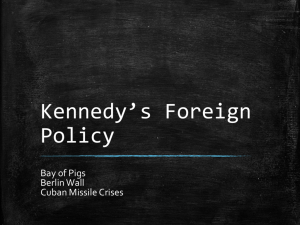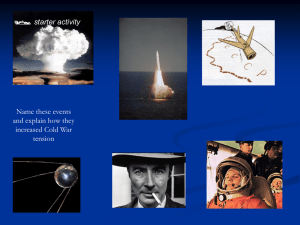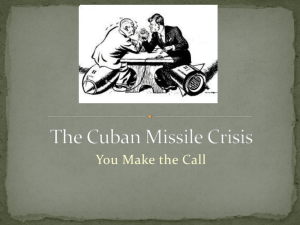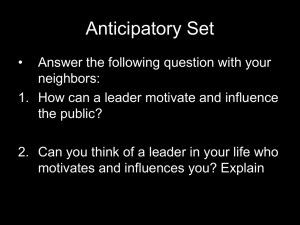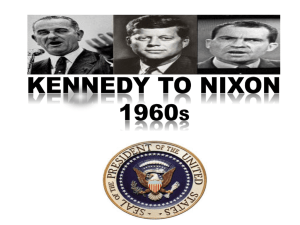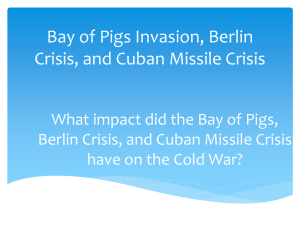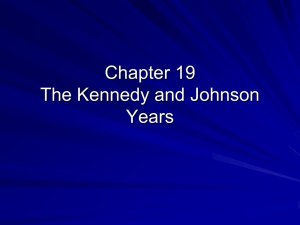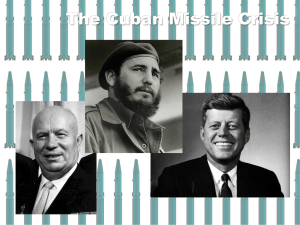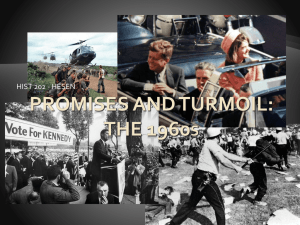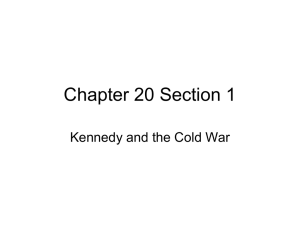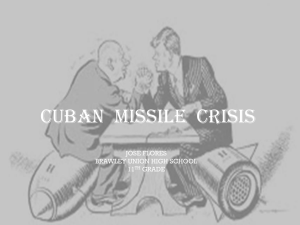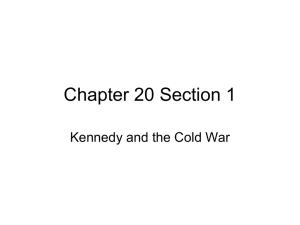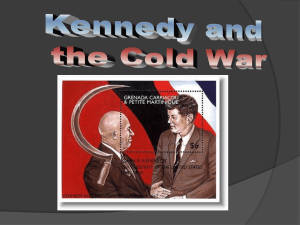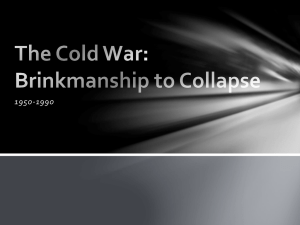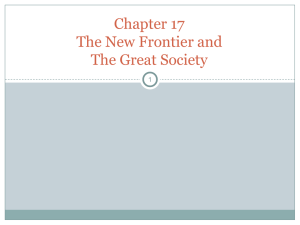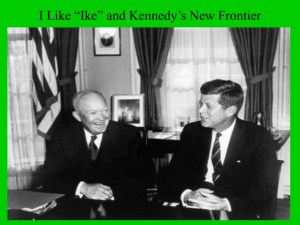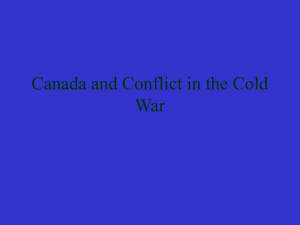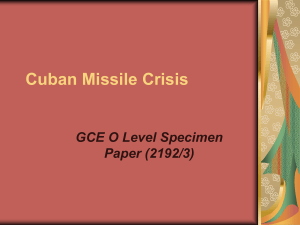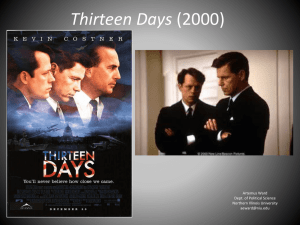New Frontier - St. John`s School AP US History Class
advertisement
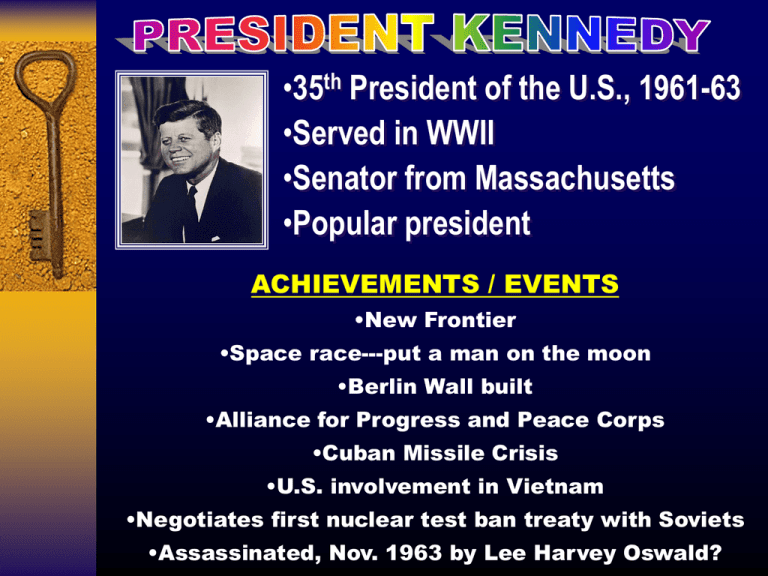
•35th President of the U.S., 1961-63 •Served in WWII •Senator from Massachusetts •Popular president ACHIEVEMENTS / EVENTS •New Frontier •Space race---put a man on the moon •Berlin Wall built •Alliance for Progress and Peace Corps •Cuban Missile Crisis •U.S. involvement in Vietnam •Negotiates first nuclear test ban treaty with Soviets •Assassinated, Nov. 1963 by Lee Harvey Oswald? The first televised presidential debates in US History took place between John Kennedy and Richard Nixon These debates impacted how the presidency would be perceived by Americans. John Kennedy Won a close and disputed election. Youngest president to be elected. 42 years of age. Kennedy's New Frontier Domestic Program •Federal funding for education •Medical care for the elderly •Government intervention to halt the recession with tax cuts. •End to racial discrimination. •Established •Alliance for Peace and Peace Corps to help Third World countries •President's Committee on Equal Employment Opportunity to end racial discrimination in hiring of govt employees. New Frontier impossible to complete •Due to conservative Congress. •Disappointed many civil rights activists = feared splitting Democratic Party. •New Frontier ideas led to President Johnson's "Great Society" Alliance for Peace statistics in Latin America. The Space Program •U.S. Astronaut John H. Glenn, Jr., standing in front of the spacecraft Friendship 7. •First astronaut to orbit the earth’s surface 3 times. •50% of the nation is under 25 in the census of 1960. •Birth Control Pill invented in 1960. •Many believed that the US was losing the Cold War to the Russians. •Kennedy’s election marks a change in power from the older generation to the WWII generation. •The youth of the nation is full of idealism. • CIA operative to overthrow Fidel Castro’s dictatorship • In 1960, Eisenhower had agreed to allow the CIA to train Guatemalans to invade Cuba at a place called the Bay of Pigs. • Kennedy allowed the plan to continue because he thought the Cubans would welcome the opportunity to overthrow Fidel Castro. • U.S. feared Castro was becoming an ally with the Soviet Union. •Failed invasion of Cuba in April of 1961. •Embarrassment for President Kennedy because the U.S. tried to cover up their involvement. •1961, Soviet Union built the Berlin Wall to force Allies out of West Berlin. Became a symbol of the Cold War. Berlin would by be a divided city. Taking advantage of a demoralized US after the failed Bay of Pigs invasion and the U-2 spy plane incident, Khruschev orders Allies out of West Berlin…. BERLIN WALL A young woman and her boyfriend talking to the woman’s mother, who is on the east side of the Berlin Wall (1962). •Families and friends found themselves separated and most Berliners were lucky just to establish visual contact over the Wall. •Stretching for more than 100 miles, escape was virtually impossible because of mines, attack dogs and armed guards with shoot-to-kill orders. •At least 2.7 million people attempted to escape by climbing, vaulting, tunneling or crashing through checkpoints. Others attempted to swim the canals or stow away in cargo shipped across the border. •Unsuccessful attempts resulted in death, mostly at the hands of East German guards. Official figures show that more than 400 people have died trying to escape from East Germany; human rights activists, however, estimate the figure to be closer to 800. Kennedy/wall President Kennedy speaking to West Berliners urging the Soviets to tear down the Berlin Wall. On the evening of Nov. 9, 1989, restrictions between the two Berlins were lifted. Celebrations around the world culminated with Germany being reunified as one country on Oct. 3, 1990. This event symbolized the end of the Cold War and the beginning of the end to communism. Major countries and leaders involved US President Kennedy Cuba Fidel Castro Soviet Union Nikta Khrushchev cuban missile2 •This U-2 reconnaissance photo showed concrete evidence of missile assembly in Cuba. Shown here are missile transporters and missile-ready tents where fueling and maintenance took place.Courtesy of CIA cuban missile2 •Low altitude view of missile preparation area. The pilot taking this shot flew at an altitude of about 250 feet, and at the speed of sound. cuban missile2 This view of a Soviet SA-2 (surface-to-air) missile pattern provided additional evidence of the Russian arming of Cuba. cuban missile2 •U.S. and Soviets prepared for war…..U.S. placed a blockade around Cuba and warned Soviets not to break through the blockade. The Soviets sent their Naval fleet to protect Cuba. Adlai Stevenson shows aerial photos of Cuban missiles to the United Nations in November 1962. cuban missile2 •The crisis developed as the U.S. demanded the Soviets to dismantle missiles in Cuba or the U.S. would invade Cuba. •Soviets refused to dismantle missile sites unless U.S. dismantled missile sites in Turkey. President Kennedy in the Oval Office with General Curtis LeMay and reconnaissance pilots who flew the Cuban missions. Third from the left is Major Richard Heyser who took the first photos of Cuban missiles. cuban missile2 cuban missile2 •Last minute decision made: Soviets would dismantle missile sites in Cuba in return for U.S.not invading Cuba. •U.S. would later dismantle missile sites in Turkey…..Not part of original deal. •Kennedy and Khruschev both realized how close they came to nuclear war. •The “monster” of nuclear war must never be released. •Both leaders vowed to better communicate with one another. •US and Soviet Union would sign their first nuclear arms limitation treaty in 1963. lbj sworn in lbj sworn in lbj sworn in Lee Harvey Oswald, “the lone gunman”, killed JFK……..Oswald murdered by Jack Ruby two days after JFK’s murder….. lbj sworn in assassination3 1. Presidents • John F. Kennedy Lyndon Johnson Richard Nixon • Kennedy Administration: 1961 to 1963 • Kennedy barely defeated Richard Nixon • Kennedy was a popular figure and set up U.S. involvement in Vietnam • “New Frontier” –Put a man on the moon • Cold War struggles: • failed Bay of Pigs Invasion--April 1961 –overthrow dictator Fidel Castro • Cuban Missile Crisis--Oct. 1962 • Build up to Vietnam--”domino theory” • Kennedy is Assassinated: Nov. 23, 1963 • Lee Harvey Oswald • LBJ’s Presidency: 1963 to 1969 • US in Vietnam War • America wanted to maintain its influence in Asia. • stop the spread of Communism---containment – Domino theory • economics: maintain trade markets in Asia • security: keep the balance of power in Asia • political: the political party in power could not "allow Vietnam to 'fall' to the Communists.” • Gulf of Tonkin Incident, Aug. 1964 • Gulf Tonkin Resolution: Aug. 1964, Congress gives President Johnson a “blank check” – U.S. troops 50,000 in 1965 to 500,000 in 1968. – VC used guerilla warfare---U.S. used • Search and destroy missions • bombing • Tet Offensive---Feb. 1968--NVN invades SVN • American people want out of Vietnam – increased anti-war protests – counter culture • 1968 Presidential election: Major issues • Vietnam and anti-war movement – President Johnson withdraws because of war…. – Nixon won with only 43.4% of the popular vote. • Nixon’s Presidency: 1969 to 1974 • Nixon reduces U.S. involvement in Vietnam • ”Vietnamization” policy –return the war to the South Vietnamese • anti-war protests----Kent State Massacre • 1972 election Nixon wins easily. • Paris Peace Accords signed 27 Jan 1973 by NV and US • US troops withdraw by Mar ‘73 • 1975, Saigon falls to NVN and SVN becomes Communistic--------U.S. loses Vietnam War
